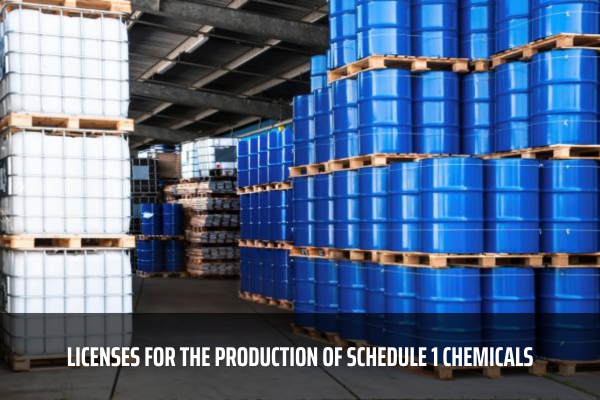What are the Schedule 1 chemicals? What are the procedures for the issuance of Licenses for the production of Schedule 1 chemicals in Vietnam?
What are the Schedule 1 chemicals in Vietnam?
Pursuant to Clause 4, Article 4 of Decree 33/2024/ND-CP, it is stated:
Definitions
...
4. Schedule 1 chemicals are toxic chemicals and precursor chemicals controlled according to the provisions of the Chemical Weapons Convention and are classified into Categories 1, 2, and 3 based on the criteria specified in the Chemical Annex of the Chemical Weapons Convention. Schedule 1 chemicals include substances listed in the Schedule and mixtures containing substances listed in the Schedule.
Therefore, Schedule 1 chemicals are toxic chemicals and precursor chemicals controlled according to the provisions of the Chemical Weapons Convention.
Schedule 1 chemicals are specified in Appendix 1 issued with Decree 33/2024/ND-CP.

What are the Schedule 1 chemicals? What are the procedures for the issuance of Licenses for the production of Schedule 1 chemicals in Vietnam?
What are the procedures for the issuance of Licenses for the production of Schedule 1 chemicals in Vietnam?
Pursuant to Clause 3, Article 11 of Decree 33/2024/ND-CP, the sequence of procedures for granting Licenses for the production of Schedule 1 chemicals is as follows:
- Organizations or individuals requesting the issuance of a license shall prepare a complete set of documents and submit it by post, in person, or through the online public service system to the Ministry of Industry and Trade.
- In case the dossier is incomplete or invalid, within three working days from the date of receiving the dossier, the Ministry of Industry and Trade shall notify the organization or individual to supplement and complete the dossier.
The time for completing the dossier shall not be counted towards the licensing period specified in Point c, Clause 3, Article 11 of Decree 33/2024/ND-CP.
- Within 16 days from the date of receiving a complete and valid dossier, the Ministry of Industry and Trade is responsible for reviewing, evaluating the dossier, and verifying the actual conditions.
+ If the production conditions are met, within three working days, the Ministry of Industry and Trade shall propose the Prime Minister to grant Licenses for the production of Schedule 1 chemicals according to Form 03 in Appendix II issued with Decree 33/2024/ND-CP.
+ If the conditions are not met, within three working days, the Ministry of Industry and Trade shall issue a written response stating the reason for not granting the license.
- If necessary, before submitting the license application to the Prime Minister, the Ministry of Industry and Trade shall seek written opinions from the specialized state management agency.
+ The maximum time for seeking opinions is five working days, excluding the time for sending and receiving documents and not counted towards the licensing period specified in this Article.
+ If the specialized state management agency does not provide written feedback within the specified time limit, it shall be deemed to agree with the organization or individual's license application.
Therefore, organizations or individuals need to follow the aforementioned sequence and procedures to be considered and granted Licenses for the production of Schedule 1 chemicals.
What is the application for applying for Licenses for the production of Schedule 1 chemicals in Vietnam?
Pursuant to Clause 2, Article 11 of Decree 33/2024/ND-CP, the application for applying for Licenses for the production of Schedule 1 chemicals includes:
- A request letter for the issuance of a Chemical Production License, according to the form specified in Form 01 in Appendix II issued with Decree 33/2024/ND-CP.
- A description of the production conditions, according to the form specified in Form 05 in Appendix II issued with Decree 33/2024/ND-CP. It should clearly state:
+ The production scale at individual-scale facilities, where the volume of reaction equipment does not exceed 100 liters, and the total volume of reaction equipment with a capacity above 5 liters does not exceed 500 liters.
+ The production scale at other facilities, where the total production quantity does not exceed 10 kg/year for protection purposes; does not exceed 100 grams/year for one chemical for research, medical, pharmaceutical purposes; does not exceed 100 grams/year for laboratories.
+ A copy of land use rights documents for constructing workshops, storage warehouses, or a lease contract for workshops, storage warehouses.
- A copy of a Bachelor's degree or higher in the chemical field of the Director, Deputy Director of Technical Affairs, or the technical staff in charge of chemical production.
- A copy of the Decision on the recognition of chemical safety training results, as regulated in Article 34 of Decree 113/2017/ND-CP, amended and supplemented by Decree 82/2022/ND-CP.
- A copy of the approved Decision or written confirmation of documents related to environmental protection, as regulated by the laws, issued by the competent state management agency.
- A copy of the document approving the fire prevention and fire fighting inspection results from the Fire and Rescue Police for each production facility subject to design approval for fire prevention and fire fighting.
A copy of the fire safety inspection report or a document from the competent authority proving compliance with fire safety conditions for each production facility not subject to mandatory design approval for fire prevention and fire fighting.
- A commitment to produce Schedule 1 chemicals for one or several specific purposes as specified in Clause 2, Article 6 of the 2020 Investment Law, including analysis, testing, scientific research, medical purposes, pharmaceutical production, criminal investigation, defense, and security protection.
Decree 33/2024/ND-CP comes into force from May 19, 2024.
LawNet